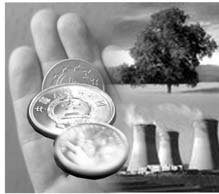
It is not exactly a recent phenomenon. But few people seem to have noticed it. Two trends have emerged from the Chinese general practice of releasing statistical updates about every industry toward the end of each year.
In one, large companies tend to boast about their revenue figures, and their contribution to the GDP. In the other, small and medium-sized enterprises (SMEs) cite their contribution to the job market.
The two camps seem to be competing for public attention, if not for importance. While containing some truth, each can be accused of conducting a publicity campaign. They may deserve to be proud of their achievements, but they also tend to be evasive about the things they have not done well. And that must be pointed out.
A press release yesterday morning, for example, declared that by the end of this year, there will be 46 enterprise groups each capable of raking in at least 100 billion yuan ($13.2 billion) in revenue income.
In other words, their combined revenue will be equivalent to 20 percent of China's GDP, if the GDP is about 23 trillion yuan, as forecast by officials of the National Bureau of Statistics.
In yet another announcement that came at the same time, all Chinese enterprise groups - and there are 2,856 of them and most of are presumably State-owned enterprises (SOEs) - may generate nearly 19 trillion yuan in business for the year. The figure is very close to the national GDP.
But the definition of revenue is vastly different from GDP. Nor does it, no matter how large the number is, reflect profits.
In fact, out of the 19 trillion yuan revenue, the 2,856 enterprise groups can report a combined profit of 1.3 trillion yuan, at a ratio of 6.8 percent. This is reportedly based on a year-on-year growth of about 25 percent - betraying an even lower ratio in the previous year.

So in terms of the quality of management, large companies in China still have a long way to go to become really competitive. And one key aspect of their management, or the management lessons they have to learn, is to reduce their continuing waste of resources.
Indeed, if measured by the industrial standards of the more competitive economies, especially standards on pollution, many Chinese companies would have to pay heavy penalties for their careless use of resources and subsequent emissions.
And the prospect of them retaining any profit would be questionable.
In a similar way, from the press releases of SMEs' national associations, one often reads about the immense job numbers that they have been able to sustain and create for China, but seldom about their progress in the green factors, such as energy efficiency and emission control.
One can discern a rather unhealthy habit in both trends in China's economic data releases. Economy is still defined by the old textbooks - and remains primarily a chase for big numbers, and not a competition for being smart and frugal, and for making more by using less.
What is the point of all the chasing, if after all, the rules of the game remain wasteful and self-destructive?
How nice it would be if the central government put a ban on all such self-glorification by various industrial interests unless there was a green factor involved - such as show how much you have done to protect the environment.
E-mail: younuo@chinadaily.com.cn
(China Daily 10/29/2007 page4)

